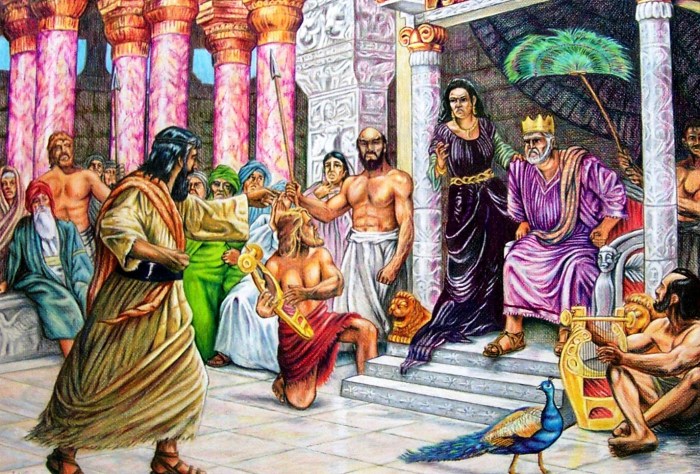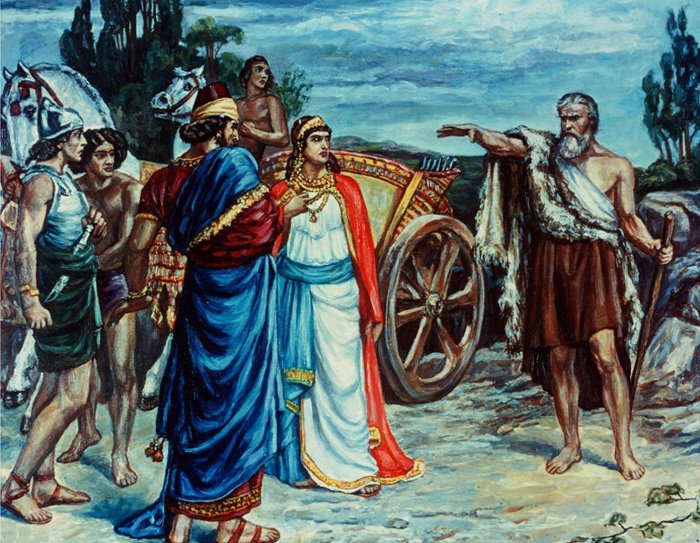Embark on an enigmatic journey with the seventh king of israel crossword, a captivating exploration of biblical history. Delve into the annals of ancient Israel, deciphering the reign and legacy of this pivotal monarch.
As you navigate the crossword’s intricate grid, uncover the challenges, religious significance, and enduring impact of this enigmatic figure. Prepare to unravel the tapestry of Israel’s past, one clue at a time.
Identify the Seventh King of Israel

The seventh king of Israel was Menahem, who reigned from 745 to 738 BCE. His reign marked a period of relative stability and prosperity for the Kingdom of Israel, following a period of political turmoil and civil war.
Historical Context
The Kingdom of Israel was established in the 10th century BCE after the split of the United Kingdom of Israel. The seventh king of Israel, Menahem, came to power during a time of political instability and civil war. The previous king, Pekah, had been assassinated, and the kingdom was divided between two factions.
Biography of Menahem
Menahem was a military commander who seized power after assassinating Shallum, the son of Jabesh, who had reigned for only one month. Menahem’s reign was marked by his successful campaigns against the Arameans and his alliance with the Assyrian Empire.
He also established a new capital at Samaria.
Accomplishments
Menahem’s reign was marked by a number of accomplishments, including:
- Successful campaigns against the Arameans, who had been a constant threat to the Kingdom of Israel.
- Alliance with the Assyrian Empire, which helped to secure the borders of the kingdom.
- Establishment of a new capital at Samaria, which became a symbol of the kingdom’s power and stability.
Explore the Challenges Faced by the Seventh King of Israel

The seventh king of Israel, Menahem, ascended to the throne during a tumultuous period marked by political instability, economic turmoil, and social unrest. These challenges significantly impacted his reign and the kingdom of Israel.
Political Challenges
Menahem faced significant political challenges throughout his reign. He ascended to power through a coup, which weakened his legitimacy in the eyes of many Israelites. Additionally, the kingdom of Israel was constantly threatened by external enemies, such as the Assyrians, who posed a constant threat to its sovereignty.
Economic Challenges
The kingdom of Israel faced severe economic challenges during Menahem’s reign. The constant warfare with neighboring kingdoms drained the kingdom’s resources, leading to high taxes and inflation. Additionally, natural disasters, such as droughts and famines, further exacerbated the economic situation.
Social Challenges
Menahem’s reign was also marked by significant social challenges. The kingdom of Israel was deeply divided between the rich and the poor, with the wealthy elite enjoying a lavish lifestyle while the majority of the population struggled to make ends meet.
This inequality led to widespread discontent and social unrest.
Analyze the Religious Significance of the Seventh King of Israel
The seventh king of Israel played a pivotal role in the religious landscape of the kingdom. His reign was marked by significant religious reforms and policies that left a lasting impact on the spiritual life of the nation.
The Role of Religion in the Reign of the Seventh King of Israel
Religion was central to the reign of the seventh king of Israel. He viewed himself as a servant of God and sought to establish a kingdom that reflected the divine will. He believed that religious observance and faithfulness to God were essential for the prosperity and stability of the nation.
Religious Reforms and Policies, The seventh king of israel crossword
The seventh king of Israel implemented several religious reforms and policies aimed at strengthening the relationship between the people and God. These included:
- Encouraging the worship of God at a central sanctuary, rather than at multiple local shrines.
- Promoting the study and observance of the Torah.
- Cracking down on idolatry and other forms of religious syncretism.
- Establishing a priesthood to lead religious ceremonies and teach the people about God’s law.
These reforms had a profound impact on the kingdom. They helped to unify the people around a common faith and strengthened their sense of national identity. They also contributed to a period of religious revival and spiritual renewal.
Create a Table of the Kings of Israel

The kings of Israel ruled over the northern kingdom of Israel from its inception in 931 BCE until its conquest by the Assyrians in 722 BCE. The following table lists the kings of Israel in chronological order, along with their reigns and accomplishments.
Table of the Kings of Israel
| King | Reign | Accomplishments |
|---|---|---|
| Jeroboam I | 931-910 BCE | First king of Israel; established the city of Shechem as his capital |
| Nadab | 910-909 BCE | Son of Jeroboam I; assassinated by Baasha |
| Baasha | 909-886 BCE | Overthrew Nadab; established the city of Tirzah as his capital |
| Elah | 886-885 BCE | Son of Baasha; assassinated by Zimri |
| Zimri | 885 BCE | Overthrew Elah; reigned for only seven days before being killed by Omri |
| Omri | 885-874 BCE | Established the city of Samaria as his capital; strengthened the kingdom of Israel |
| Ahab | 874-853 BCE | Son of Omri; married Jezebel, a Phoenician princess; introduced the worship of Baal to Israel |
| Ahaziah | 853-852 BCE | Son of Ahab; reigned for only two years before dying from a fall |
| Joram | 852-841 BCE | Brother of Ahaziah; defeated the Moabites |
| Jehu | 841-814 BCE | Overthrew Joram; destroyed the worship of Baal in Israel |
| Jehoahaz | 814-801 BCE | Son of Jehu; reigned during a time of decline for the kingdom of Israel |
| Jehoash | 801-786 BCE | Son of Jehoahaz; recovered some of the territory lost by his father |
| Jeroboam II | 786-746 BCE | Son of Jehoash; reigned during a time of prosperity for the kingdom of Israel |
| Zechariah | 746 BCE | Son of Jeroboam II; reigned for only six months before being assassinated |
| Shallum | 746 BCE | Overthrew Zechariah; reigned for only one month before being assassinated |
| Menahem | 745-738 BCE | Overthrew Shallum; strengthened the kingdom of Israel |
| Pekahiah | 738-737 BCE | Son of Menahem; assassinated by Pekah |
| Pekah | 737-732 BCE | Overthrew Pekahiah; formed an alliance with Rezin, king of Aram, against Judah |
| Hoshea | 732-722 BCE | Last king of Israel; overthrown by the Assyrians |
The seventh king of Israel was Jehu, who reigned from 841-814 BCE. Jehu was a usurper who overthrew Joram, the son of Ahab. Jehu was a ruthless king who destroyed the worship of Baal in Israel and killed all of Ahab’s descendants.
Jehu’s reign was a time of great turmoil for the kingdom of Israel, but he also strengthened the kingdom and expanded its territory.
Illustrate the Reign of the Seventh King of Israel: The Seventh King Of Israel Crossword

The seventh king of Israel, Jehu, ascended to the throne after assassinating his predecessor, Joram. His reign marked a significant turning point in the history of Israel, characterized by both military conquests and religious reforms.
Jehu’s military prowess was evident in his successful campaigns against the neighboring kingdoms of Moab and Edom. He also subdued the Philistines, who had long been a threat to Israel. Jehu’s military victories expanded the boundaries of Israel and brought him great renown.
Religious Reforms
Jehu’s religious reforms were equally significant. He sought to purge Israel of the worship of Baal, which had become widespread during the reign of Ahab and Jezebel. Jehu ordered the destruction of Baal temples and altars and executed the priests of Baal.
He also reinstated the worship of Yahweh as the sole God of Israel.
Jehu’s religious reforms were met with mixed reactions. While some welcomed the return to traditional Israelite beliefs, others resented the suppression of Baal worship. Nonetheless, Jehu’s actions had a lasting impact on the religious landscape of Israel.
FAQ Resource
Who was the seventh king of Israel?
Jehu, son of Nimshi
What were the major challenges faced by the seventh king of Israel?
Political instability, economic decline, and foreign invasions
What was the religious significance of the seventh king of Israel?
He implemented religious reforms to eradicate the worship of Baal and promote the worship of Yahweh